With 10 days to go in Iran’s unpredictable presidential campaign, what in the world is Hassan Rouhani doing? The country’s president has suddenly adopted a subversive tone, admonishing the powerful Revolutionary Guard Corps for anti-Israeli slogans, denouncing censorship, and most notably vilifying one of his challengers, a fellow cleric, as someone who knows “only prison and death.” Earlier this week, Rouhani framed his campaign as a message to “the extremists and those who use violence that your era is over.” Rouhani’s abrupt embrace of combative rhetoric has prompted double takes and intense speculation about whether the incumbent has transformed into an insurgent and why.
Analysts have proffered several plausible explanations—that the fierce infighting over the nuclear deal and his economic agenda has embittered Rouhani; that he’s realized he may lose a tougher-than-anticipated reelection battle and wants to go out swinging; even that his wrath is a warning of the consequences that would ensue if the system seeks to oust him via electoral machinations.
Iran’s presidency is an exasperatingly constrained office—simultaneously the locus of popular aspirations for representative rule and, in its limited authority, the symbol of their enduring frustration. Each of Rouhani’s predecessors has gradually become less pliable during his time in office, and perhaps the president’s campaign rhetoric is merely a signal that his famous smile is giving way to his more infamous temper.
Déjà vu?
All these explanations are possible, but my own interpretation is a bit more cynical: Iran’s president is simply reverting to the anti-establishment campaign strategy that served him well the first time around. In fact, many were asking precisely the same question four years ago, at precisely the same point in the campaign. Then, Rouhani was midway through his unexpected first bid for Iran’s presidency when he traveled to Isfahan and joined the mourning procession for a dissident cleric who had denounced the country’s leaders as “henchmen of tyranny.”
That moment, along with other curiously compelling jabs on the stump, served as a wake-up call that Rouhani wasn’t simply another gray-bearded bureaucrat mouthing tired revolutionary slogans. Rather, he was a man with a plan—a plan aimed at generating sufficient voter turnout to revive the Islamic Republic’s battered legitimacy and fashioning a broad political coalition that could win the race and extricate Iran from the nuclear crisis.
Rouhani has achieved those goals, an enviable track record by the slender standards of Iran’s elected executives. But despite the Islamic Republic’s well-established pattern of two-term presidencies, his reelection campaign is facing two steep threats: the artfully mobilized candidacy of hardline cleric Ibrahim Raisi and the mounting disillusionment with the inevitable failure of the nuclear deal to transform the lives of Iran’s citizenry. Although many outside Iran have written off Raisi as devoid of charisma or relevant experience, he is rising in some internal polls; the dynamics of a three-way competition between Rouhani, Raisi, and Tehran mayor Mohammad Baqr Qalibaf could plausibly catapult Raisi into a runoff showdown with a commanding lead over Rouhani.
So it’s hardly surprising that Rouhani is going back to his old playbook of calculated provocation, reckoning that an air of insubordination can galvanize a surge from his old supporters. However, it is an even more uncertain bet this time around, especially with the long shadow cast by a prior episode of election upheaval. In 2013, it was essential that Rouhani coopt the regime’s critics as the campaign neared its conclusion: His reformist rival had not yet agreed to drop out and there were profound uncertainties about whether voters would even bother to turn out for the first presidential ballot since the 2009 upheaval. Rouhani’s strategy served its purpose then, galvanizing a durable coalition with the reformists and injecting more excitement into the campaign as a get-out-the-vote tactic.
Second time a charm?
This time around, Rouhani’s challenges are different: He has no real worries about a challenge from the few remaining reformists within the political establishment. However, as the incumbent, he is now the natural target for the frustration that is a perennial aspect of Iran’s political temperament—frustration that was exacerbated by the gap between Rouhani’s triumphalism surrounding the nuclear deal and its meager benefits for the lives of ordinary Iranians. The president needs to rally his latent base to go out to the polls on May 19 in large numbers to avoid the intense uncertainties of a runoff with Raisi. A little incitement toward his political adversaries may just do the trick.
That Rouhani has once again become an unexpected standard bearer for reform in the Islamic Republic does not foreshadow a shift in his approach to governance if he in fact holds on to the presidency for a second term. It’s entirely possible that Rouhani, whose factional identification has always favored the pragmatic wing of the conservative camp, may have developed an appreciation for the fundamental exigency of democratic reform in the Islamic Republic. However, even if that is the case, he is far too savvy to repeat the mistakes of his predecessors—who effectively ended their political careers by openly sparring with the supreme leader and his acolytes—and the public will have even less prospect of holding him to any nebulous promises in a second term than they have in the first.
What should not be lost amidst Rouhani’s fireworks is the ominous messaging emanating from Iran’s supreme leader, Ayatollah Ali Khamenei, as well as other senior representatives of the security bureaucracy. Today, at a ceremony for graduating IRGC officers, Khamenei railed against supposed foreign conspiracies surrounding this election and previous ones, threatening that “if anyone acts against national security, there will certainly be a slap in the face.” These statements offer unnerving echoes of the warnings issued in the days leading up to the 2009 vote, when the official pronouncement of an overwhelming reelection victory for then-president Mahmoud Ahmadinejad sparked massive protests throughout Iran and launched the country’s first serious opposition movement.
This makes the Rouhani campaign strategy even more interesting—and much more risky. His pointed inferences to Raisi’s role in the execution of thousands of political prisoners in 1988 and subsequent incidents of brutality toward Iranians would be difficult to brush aside should public opinion or elite manipulation point the outcome in Raisi’s favor. Over the course of the next 10 days, Iran’s tragic past and its uncertain future will converge at the ballot box, and what comes next is—as always with Iran—impossible to predict.
The Brookings Institution is committed to quality, independence, and impact.
We are supported by a diverse array of funders. In line with our values and policies, each Brookings publication represents the sole views of its author(s).


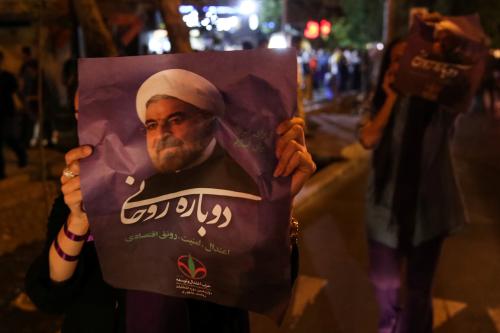
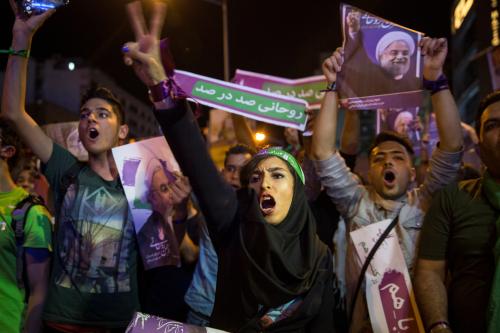
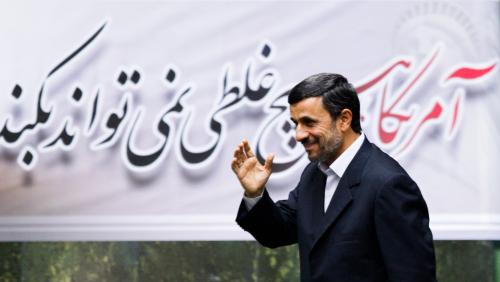

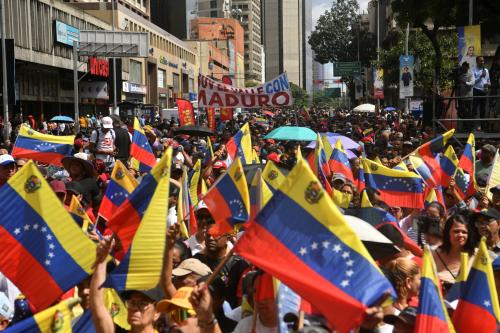
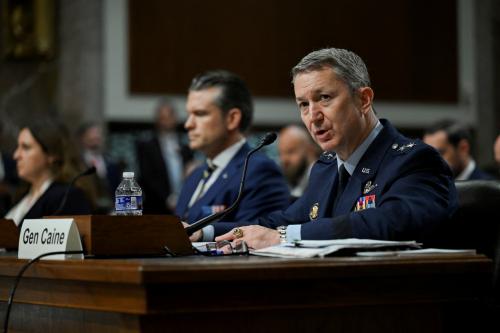
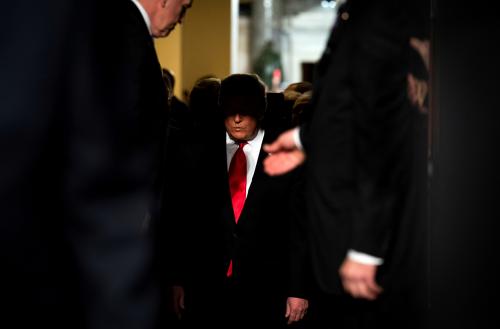
Commentary
Is Rouhani going rogue?
May 10, 2017